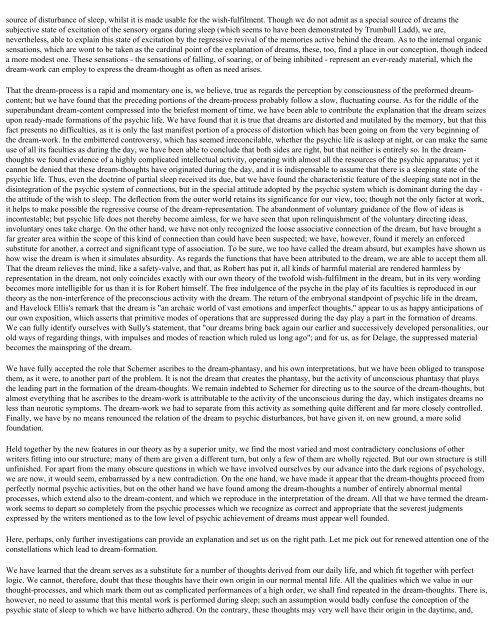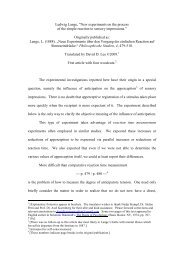The Interpretation Of Dreams Sigmund Freud (1900) PREFACE
The Interpretation Of Dreams Sigmund Freud (1900) PREFACE
The Interpretation Of Dreams Sigmund Freud (1900) PREFACE
Create successful ePaper yourself
Turn your PDF publications into a flip-book with our unique Google optimized e-Paper software.
source of disturbance of sleep, whilst it is made usable for the wish-fulfilment. Though we do not admit as a special source of dreams the<br />
subjective state of excitation of the sensory organs during sleep (which seems to have been demonstrated by Trumbull Ladd), we are,<br />
nevertheless, able to explain this state of excitation by the regressive revival of the memories active behind the dream. As to the internal organic<br />
sensations, which are wont to be taken as the cardinal point of the explanation of dreams, these, too, find a place in our conception, though indeed<br />
a more modest one. <strong>The</strong>se sensations - the sensations of falling, of soaring, or of being inhibited - represent an ever-ready material, which the<br />
dream-work can employ to express the dream-thought as often as need arises.<br />
That the dream-process is a rapid and momentary one is, we believe, true as regards the perception by consciousness of the preformed dreamcontent;<br />
but we have found that the preceding portions of the dream-process probably follow a slow, fluctuating course. As for the riddle of the<br />
superabundant dream-content compressed into the briefest moment of time, we have been able to contribute the explanation that the dream seizes<br />
upon ready-made formations of the psychic life. We have found that it is true that dreams are distorted and mutilated by the memory, but that this<br />
fact presents no difficulties, as it is only the last manifest portion of a process of distortion which has been going on from the very beginning of<br />
the dream-work. In the embittered controversy, which has seemed irreconcilable, whether the psychic life is asleep at night, or can make the same<br />
use of all its faculties as during the day, we have been able to conclude that both sides are right, but that neither is entirely so. In the dreamthoughts<br />
we found evidence of a highly complicated intellectual activity, operating with almost all the resources of the psychic apparatus; yet it<br />
cannot be denied that these dream-thoughts have originated during the day, and it is indispensable to assume that there is a sleeping state of the<br />
psychic life. Thus, even the doctrine of partial sleep received its due, but we have found the characteristic feature of the sleeping state not in the<br />
disintegration of the psychic system of connections, but in the special attitude adopted by the psychic system which is dominant during the day -<br />
the attitude of the wish to sleep. <strong>The</strong> deflection from the outer world retains its significance for our view, too; though not the only factor at work,<br />
it helps to make possible the regressive course of the dream-representation. <strong>The</strong> abandonment of voluntary guidance of the flow of ideas is<br />
incontestable; but psychic life does not thereby become aimless, for we have seen that upon relinquishment of the voluntary directing ideas,<br />
involuntary ones take charge. On the other hand, we have not only recognized the loose associative connection of the dream, but have brought a<br />
far greater area within the scope of this kind of connection than could have been suspected; we have, however, found it merely an enforced<br />
substitute for another, a correct and significant type of association. To be sure, we too have called the dream absurd, but examples have shown us<br />
how wise the dream is when it simulates absurdity. As regards the functions that have been attributed to the dream, we are able to accept them all.<br />
That the dream relieves the mind, like a safety-valve, and that, as Robert has put it, all kinds of harmful material are rendered harmless by<br />
representation in the dream, not only coincides exactly with our own theory of the twofold wish-fulfilment in the dream, but in its very wording<br />
becomes more intelligible for us than it is for Robert himself. <strong>The</strong> free indulgence of the psyche in the play of its faculties is reproduced in our<br />
theory as the non-interference of the preconscious activity with the dream. <strong>The</strong> return of the embryonal standpoint of psychic life in the dream,<br />
and Havelock Ellis's remark that the dream is "an archaic world of vast emotions and imperfect thoughts," appear to us as happy anticipations of<br />
our own exposition, which asserts that primitive modes of operations that are suppressed during the day play a part in the formation of dreams.<br />
We can fully identify ourselves with Sully's statement, that "our dreams bring back again our earlier and successively developed personalities, our<br />
old ways of regarding things, with impulses and modes of reaction which ruled us long ago"; and for us, as for Delage, the suppressed material<br />
becomes the mainspring of the dream.<br />
We have fully accepted the role that Scherner ascribes to the dream-phantasy, and his own interpretations, but we have been obliged to transpose<br />
them, as it were, to another part of the problem. It is not the dream that creates the phantasy, but the activity of unconscious phantasy that plays<br />
the leading part in the formation of the dream-thoughts. We remain indebted to Scherner for directing us to the source of the dream-thoughts, but<br />
almost everything that he ascribes to the dream-work is attributable to the activity of the unconscious during the day, which instigates dreams no<br />
less than neurotic symptoms. <strong>The</strong> dream-work we had to separate from this activity as something quite different and far more closely controlled.<br />
Finally, we have by no means renounced the relation of the dream to psychic disturbances, but have given it, on new ground, a more solid<br />
foundation.<br />
Held together by the new features in our theory as by a superior unity, we find the most varied and most contradictory conclusions of other<br />
writers fitting into our structure; many of them are given a different turn, but only a few of them are wholly rejected. But our own structure is still<br />
unfinished. For apart from the many obscure questions in which we have involved ourselves by our advance into the dark regions of psychology,<br />
we are now, it would seem, embarrassed by a new contradiction. On the one hand, we have made it appear that the dream-thoughts proceed from<br />
perfectly normal psychic activities, but on the other hand we have found among the dream-thoughts a number of entirely abnormal mental<br />
processes, which extend also to the dream-content, and which we reproduce in the interpretation of the dream. All that we have termed the dreamwork<br />
seems to depart so completely from the psychic processes which we recognize as correct and appropriate that the severest judgments<br />
expressed by the writers mentioned as to the low level of psychic achievement of dreams must appear well founded.<br />
Here, perhaps, only further investigations can provide an explanation and set us on the right path. Let me pick out for renewed attention one of the<br />
constellations which lead to dream-formation.<br />
We have learned that the dream serves as a substitute for a number of thoughts derived from our daily life, and which fit together with perfect<br />
logic. We cannot, therefore, doubt that these thoughts have their own origin in our normal mental life. All the qualities which we value in our<br />
thought-processes, and which mark them out as complicated performances of a high order, we shall find repeated in the dream-thoughts. <strong>The</strong>re is,<br />
however, no need to assume that this mental work is performed during sleep; such an assumption would badly confuse the conception of the<br />
psychic state of sleep to which we have hitherto adhered. On the contrary, these thoughts may very well have their origin in the daytime, and,



